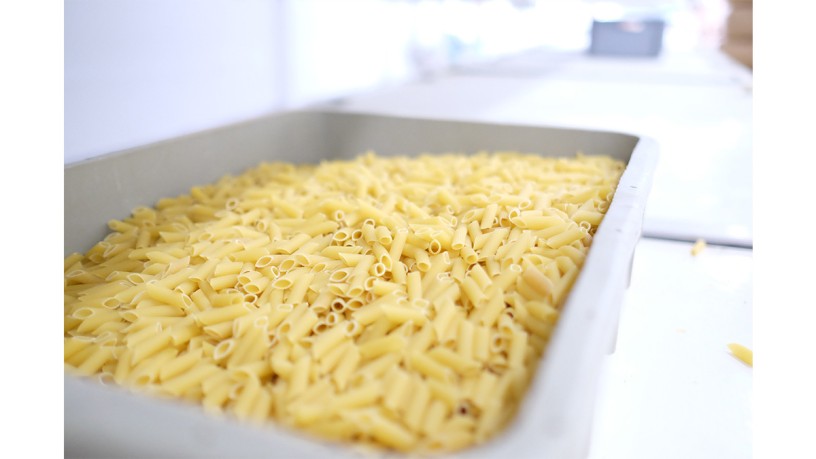How Fit Are Our Food Chain Systems?
Pressure to act across all sectors
Meeting the demand for food and beverages for a growing world population is a central concern of the global food industry. In doing so, it must face up to the demands of climate change and society. At Anuga FoodTec from 19 to 22 March 2024, everything will revolve around the challenge of how the industry must align the future of production in order to ensure security of supply as part of the main theme of Responsibility. This also involves resilience. Since the pandemic at the latest, every producer has been familiar with it. Companies that are able to adapt to internal and external changes and disruptions in complex, rapidly changing value creation networks and that deliver reliable, high-quality products even under changing conditions are considered to be economically resilient. Resilient food systems are essential for guaranteeing basic supplies. However, it is not just the delivery of the food that is important. Above all, it is crucial that consumers receive products that are safe for their health. Due to current crises and scarcity of resources, there is great pressure for action across all sectors to strengthen the resilience of food production. This is the result of surveys and discussions with trade associations and companies in the food industry, carried out by the research team of the Fraunhofer initiative ReSearchL.
Greater regionalisation as a solution
"The course along the value chain must be set anew in the food industry," says Prof Andrea Büttner. Only then can the supply of high-quality food be guaranteed in the future, and not just in times of crisis. Büttner, who as Managing Director of the Fraunhofer Institute for Process Engineering and Packaging (IVV) is in charge of the ReSearchL project, worked with other Fraunhofer Institutes to investigate which strategies need to take effect in the process chain in order to minimise the effects of disruption scenarios. The researchers used a vegetable oil mill as an example. Background: The Central European vegetable oil market is characterised by large oil mills with a throughput of one million tonnes per year, which almost exclusively process rapeseed or sunflowers. This lack of raw material diversity, the large production facilities, the low value of domestic feed meal and the resulting dependence on transport from Eastern Europe, Asia and South America make the system vulnerable to crop failures, plant diseases and much more. It shows the highly complex interconnectedness of the global food system, which relies on both local and global supplier networks and supply chains. Greater regionalisation, on the other hand, can significantly increase the production resilience. This is the conclusion reached by the ResearchL researchers – at least in the case of the oil mills. For example, if they switch from rapeseed and sunflower seeds to other oilseeds due to supply difficulties.

Der Anbau von verschiedenen Pflanzen, darunter Salat, Kräuter und Kartoffeln, wurden in der patentierten OrbiPlant-Anlage bereits getestet. © Fraunhofer IME | Simon Vogel
Vertical farming put to the test as a model for the future
Another model being targeted by the Fraunhofer initiative is vertical farming. In this form of agriculture, plants are cultivated indoors under controlled conditions. Equipped with state-of-the-art automation technology, such an indoor cultivation system can provide plants of different types continuously and independently of the weather, time of day and season. In this way, it expands the possibilities of crop cultivation and brings food production to densely populated urban areas – with less water and fertiliser than conventional field cultivation. Systems for vertical farming are considered more resilient to environmental influences due to their closed, modular design. However, this controlled production approach is susceptible to technical and, to a certain extent, biological disruptions due to the indoor conditions that must be continuously guaranteed. For this reason, the Fraunhofer Institute for Molecular Biology and Applied Ecology (IME), together with the Fraunhofer Institute for Production Technology (IPT), investigated relevant disturbances in an exemplary basil production process as part of ReSearchL. The scientists use the OrbiPlant vertical farming system for their investigations. Here, they induced technical and plant-specific disturbances that could be clearly detected using suitable sensor technology and real-time recording of the system data.
New protein cultivation systems
This resilience approach pursued by the Fraunhofer Institutes goes beyond simple monitoring with error notification and should make an important contribution to securing the supply of high-quality food in the future. Another advantage is the full automation and scalability of the cultivation process. Growing conditions such as light or nutrients and ultimately even the flavour of the harvested produce can be improved and productivity increased. In addition, vertical farming technology can be directly linked to processing industries, enabling complete value creation from cultivation to the finished food. A future model that Jan Bredack is already working on. The founder and CEO of the Veganz Group is working together with the Fraunhofer IME on new cultivation systems and processes to grow peas as a source of protein all year round. These systems are independent of the climate and as a result highly are efficient and resilient, making them available for the production of meat alternatives. Following the successful launch of the joint project, Veganz secured the rights to the OrbiPlant vertical farming platform technology for the cultivation of food crops as an exclusive licence in June 2023. "To date, vertical farming has mainly been used to grow lettuce and herbs for regional supply to retailers and wholesalers. With our approach of direct industrial utilisation of the cultivated products, we are not only creating the basis for a profitable business model. We are also achieving local food security to provide the population with a basic supply of healthy, plant-based proteins and carbohydrates through the cultivation and production of plant-based staple foods, regardless of the conditions anywhere in the world," says Bredack.




